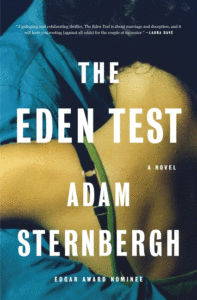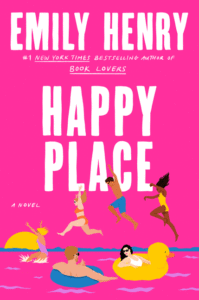
Dennis Lehane’s Small Mercies, Claire Dederer’s Monsters, Emily Henry’s Happy Place, and Lucinda Williams’ Don’t Tell Anybody the Secrets I Told You all feature among the Best Reviewed Books of the Weeks.
1. Small Mercies by Dennis Lehane
(Harper)
7 Rave • 3 Positive
Read an interview with Dennis Lehane here
“Land[s] like a fist to the solar plexus … Full of booby traps, but the metaphorical kind that blow up futures instead of limbs: negligent parents, busted marriages, dead-end jobs, booze, poverty, violence, resentment, and misdirected hate … The stakes with a series detective are by necessity low. But in a stand-alone crime novel like Small Mercies all bets are off … Lehane has always captured this tetchy, volatile mixture of working-class pride and shame with an expertise born of firsthand experience … Lehane’s historical pop-culture references are impeccable.”
–Laura Miller (The New Yorker)

2. The Eden Test by Adam Sternbergh
(Flatiron)
4 Rave
“In stylish prose, Sternbergh constructs a lustrous domestic suspense novel … The novel has an almost midcentury coolness in tone, and Daisy, an actor, is like a Hitchcock blonde, self-contained and enigmatic … Deliciously entertaining, but its portrait of a marriage in trouble is nuanced and serious, hopeful and melancholy. There are real impacts under its glitter.”
–Flynn Berry (The New York Times Book Review)

3. Happy Place by Emily Henry
(Berkley Books)
3 Rave • 1 Positive
“Henry covers new territory. It is, in many ways, the least ‘happy’ of her works, less swooning and more longing, with a sense of melancholy permeating throughout … Most of Henry’s books focus on two characters, but this ensemble piece presents female friendship in all its warmth and woundedness, blessedly absent of misogynist tropes of jealousy and pettiness. Admittedly, Sabrina, Cleo and their counterparts don’t come through as sharply as the two leads, their motives mostly a mystery until the final chapters … The core of the novel is, without question, the ballad of Harriet and her ex-fiancé, Wyn. The novel is structured in flashbacks that detail their initial attraction, their mutual devotion and the sudden, shattering breakup that devastates them both … Henry operates at the top of her — and her readers’ — intelligence, telling sophisticated, heartfelt stories that are conscious of the romantic comedy conventions without being overly meta about them … Happy Place is funny at points, but it is also the closest that Henry has come to writing an old-school melodrama, a heart-rending plot that struggles to express the inexpressible.”
–Annie Berke (The Washington Post)
**
1. Monsters by Claire Dederer
(Knopf)
5 Rave • 7 Positive • 2 Pan
Read an excerpt from Monsters here
“What made for a compelling essay at that moment makes for an even better book. In Monsters: A Fan’s Dilemma, Dederer doesn’t arrive at some neat conclusion, because there are no easy answers to the vexing questions she wrangles with … Dederer…just keeps getting better and smarter. In Monsters, she ties herself in intellectual and emotional knots, poking holes in her own arguments with gusto. In contrast to so many nonfiction books adapted from articles, Monsters doesn’t stretch a singular thesis over several hundred pages. Quite the contrary, it’s absolutely exhilarating to read the work of someone so willing to crumple up her own argument like a piece of paper, throw it away and start anew. She’s constantly challenging her own assumptions, more than willing to find flaws in her own thinking.”
–Allison Arieff (The San Francisco Chronicle)
2. Don’t Tell Anybody the Secrets I Told You: A Memoir by Lucinda Williams
(Crown)
5 Rave • 1 Positive
Read an excerpt from Don’t Tell Anybody the Secrets I Told You here
“Remarkable for its true insight into the author as a person and as an artist … Woven into Williams’ story, which moves mostly chronologically and discusses family trauma and mental health with openness, are the nitty-gritty of album-making and the lyrics to many of her songs, with the stories behind them.”
–Annie Bostrom (Booklist)
3. Affinities by Brian Dillon
(New York Review of Books)
4 Rave • 2 Positive
Read an excerpt from Affinities here
“A principled approach to critical work, one that illuminates connections without insistence, proposes without foreclosure and reflects, of course, the path of art itself: observations, juxtapositions, alliances—affinities, indeed—that resist easy determination. One might say, then, that Dillon makes of criticism an artistic practice.”
–Claire Messud (The New York Times Book Review)

